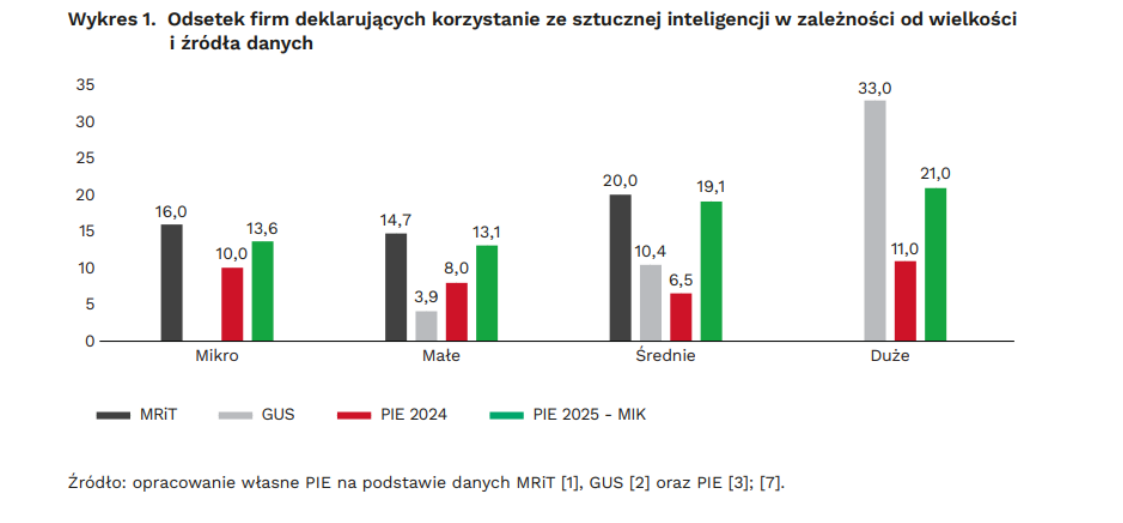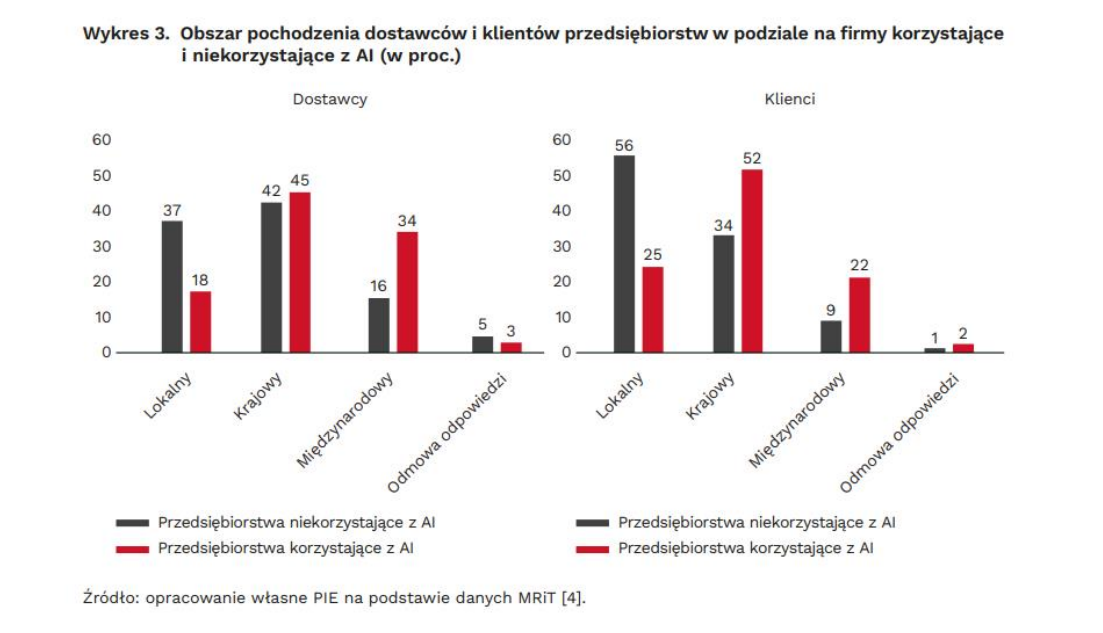Polish companies avoid artificial intelligence

- According to a research review conducted by the Polish Economic Institute, AI is most often used by micro-enterprises and large enterprises.
- Enterprises that most frequently use artificial intelligence also clearly stand out from the market.
- They are nearly 2.5 times more likely to serve foreign customers and more than twice as likely to cooperate with suppliers from outside Poland than companies that have not yet implemented these solutions.
According to data from the Central Statistical Office (GUS), in 2024 only 5.9% of Polish companies used artificial intelligence, but analyses by the Polish Economic Institute indicate that the use of this technology varies and depends on factors such as the size of the company, the industry in which it operates, and the level of digitization.
Differing research methodologies also lead to differences in the estimates obtained. Data from the Institute of Information Technology and the Ministry of Sport and Tourism show that up to 16% of micro and 15% of small businesses use AI solutions, while the figure for large enterprises is 11%, significantly lower than the 33% reported by the Central Statistical Office.
The latest results of the PIE Monthly Business Climate Index additionally indicate that artificial intelligence is finding increasingly wider application among medium-sized (19%) and large (21%) companies.
The diversity of results and the rapid development of AI tools make it difficult to clearly determine the scale of their use.

The Polish Economic Institute's report "AI in Polish enterprises" shows that companies are more likely to implement artificial intelligence when their employees, especially managers, have higher digital competences, already use other digital technologies, and cooperate internationally.
Another important factor is the positive assessment of the economic situation – companies that perceive favorable economic conditions are more willing to invest in AI.
"Our research has shown that artificial intelligence is a natural complement to earlier digitization processes – the more areas of activity are automated and digitized, the greater the likelihood of implementing AI solutions. The development of digital competencies, international cooperation, and ensuring adequate financing and implementation planning are crucial to increasing the adoption of this technology," emphasizes Ignacy Święcicki, head of the PIE digital economy team.
Companies using artificial intelligence are more strongly linked to foreign markets. Enterprises with foreign capital are more likely to engage in AI-related investments, while nearly 90% of companies that do not plan to implement AI are entities with only Polish capital.
These companies are more likely to serve customers and cooperate with foreign suppliers, and at the same time, they are more optimistic about the future – as many as two-thirds of them anticipate revenue growth within three years, while among other companies this percentage is over 20 percentage points lower.
PIE research also shows that AI implementations usually meet or even exceed the expectations of companies that treat this technology as a tool for increasing efficiency and maintaining a competitive advantage.

"The challenge for companies that don't use AI is cost and competency barriers. One in five cited excessively high costs as the main obstacle, while among companies using AI, this percentage is almost twice as low. Lack of staff readiness and the need for training are also more common. At the same time, it's worth noting that the actual use of AI isn't always driven by company strategy. Initiatives related to the use of AI can be grassroots in nature and stem from the actions of young employees using free AI-based tools, suggesting that the actual scale of this technology's use may be greater than the statistics indicate," notes Jakub Witczak, senior analyst in the Digital Economy Team.
Companies are implementing AI to gain a competitive advantage, not to reduce employment.The main reasons why companies in Poland are turning to AI are streamlining management, improving efficiency, building the image of a modern organization, and maintaining competitiveness. Companies also appreciate the time savings and cost reductions.
The PIE study also shows that employment reduction is not a motivation for implementing artificial intelligence, although it is worth noting that it changes the competence profile in the enterprise.
"The impact of artificial intelligence on employment in Poland remains limited for now. According to research from the Central Statistical Office (GUS), only 5% of industrial companies using AI have seen a decline in their employment numbers, and only 3% of enterprises currently use this technology. However, the PIE study shows that while AI doesn't change the scale of employment, it can influence its structure. Companies are reporting a greater demand for highly skilled specialists, including programmers and data analysts, while simultaneously reducing junior positions. Some employees are also being transferred to other departments, which demonstrates the growing importance of competency changes related to the implementation of new technologies," says Magdalena Lesiak, senior analyst in the PIE Digital Economy Team.
wnp.pl





